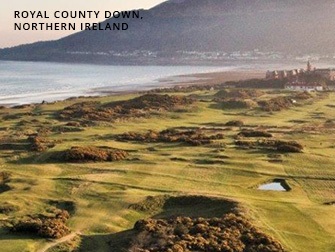
As 2009 draws to a welcome close, and travel operators and our clients turn to face 2010, we do so as an industry and as individual travelers who may never be the same.
The travel industry was as affected as any during the last 14 months. Hotels, airlines, cruise lines and tour operators have all seen traffic collapse, margins tumble and yields diminish. We will see our business drop by 50 percent in FY 2009; fortunately, as a well-capitalized and conservative business, we have always operated with the knowledge that the good times are not forever and planned accordingly.
From early indications, I am extremely confident we shall see very comfortable double digit growth in 2010. We see a number of indicators suggesting ongoing (albeit sluggish) improvement in our core business of international golf travel.
During the financial meltdown, this group of male golf travelers virtually disappeared. No one was confident enough to predict the bottom, and many simply decided to keep a low profile, focusing on their businesses and conserving their resources. Of the car dealers, investment bankers, developers, home builders and others who comprise this high-end male core golfer market, it was hard to find a group of eight guys who historically travel together who were all unaffected by the downturn. Given the dynamics of golf groups, if two or three of the usual participants could not travel, the group as a whole would not travel. It became golf travel’s version of the perfect storm.
But in the last three months we have seen a noticeable upturn in this segment. Interestingly, I even think I know when the market began to turn and the impetus. It was that fateful weekend at Turnberry, in Scotland during the Open Championship, when Tom Watson ignited the crowd and reminded golfers the world over that north of 50 was not over the hill.
I spoke to any number of personal contacts during the week following the Open and to a person they all were energized by Watson. We immediately saw a significant spike in inquiries and prospects beginning the process of booking a trip.
From a consumer perspective, this is still a great time to travel and take advantage of some of the best travel deals I can remember. Most suppliers have been creative in their attempts to attract clients. Hotels offering a third or fourth night free are plentiful.
Whereas golf courses in the British Isles historically have been immune to creative marketing ideas, there are a plethora of examples where old line golf clubs have come up with great ideas to stimulate demand. For example, discounted greens for a foursome and free replay rounds, two ideas which were never a feature of British Isles golf previously.
The sense I overwhelmingly get is that suppliers have reset prices and expectations in what is now the “new normal.” Strategic deals will be available for an extended period of time, but as the economy inches along, they too will become more targeted, trying to drive traffic to early morning tee times or extend a hotel stay beyond the historical norm.
For suppliers, we are not out of the woods yet. Much work still needs to be done and anyone who thinks we are going to return the “old normal” will be sadly disappointed. Prices and yields may slowly improve over the next 12 months, but budgets shall remain tight. Consumers will not be buying the expensive bottles of wine at the same prices rate they did previously and caddie tips may be smaller.
Interestingly, as some of the top hotels and golf courses cut prices, facilities or regions that were previously considered “value” opportunities are feeling the pressure. The problem is that these secondary facilities have little room to lower prices. The situation exists in Scotland where people now can stay at a 5 star hotel for the same price as a 3 star in the same town. Common sense would say that the higher profile golf courses and better hotels will rebound quickest due to their pricing changes and marketing programs.
Over the last 12 months, as I have communicated regularly with our offices around the world, the feedback has been interesting. It is easy to get caught up in our own worlds, but the full impact of the financial crisis was much like a rolling wave. For example, the sentiment in New Zealand was fairly bullish until the last six months. In South Africa (curiously) they were almost ahead of the US in terms of pessimistic market sentiment. Another measure of local sentiment is how and more importantly when suppliers in the destination responded with meaningful offers.
Parents and friends who were touched by the Great Depression speak of how it affected – and continues to affect – the attitudes, behavior and buying habits of a generation. By comparison the last 12 months have been a bump on the road. But I think it was a bump that will continue to have a long-term impact on a large percentage of the population in terms of how they perceive value. Their expectations for value have been ratcheted up a few more notches – and suppliers at the luxury end of the travel world will be expected to deliver on their terms.
Best wishes for the New Year.
About the Author: Gordon Dalgleish is the Co-Founding Director of PerryGolf, the leading provider of international golf vacations. You can find him on Google+
